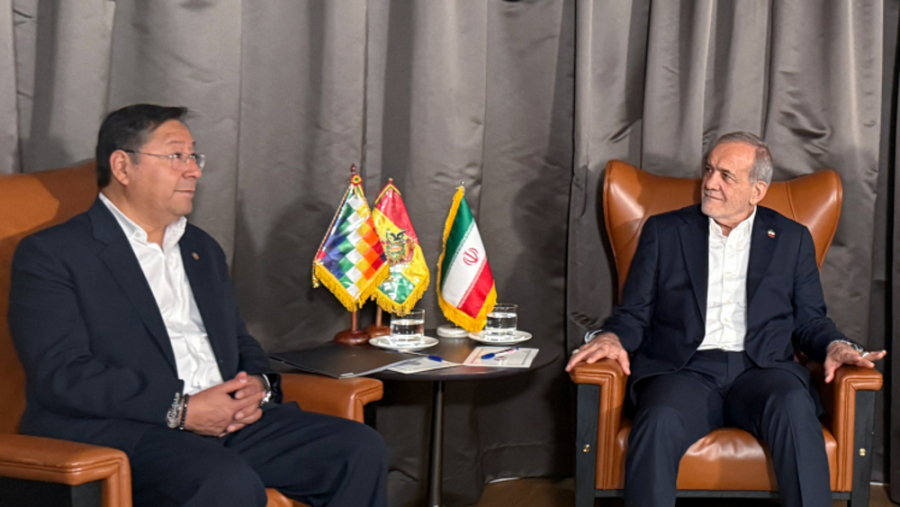President Masoud Pezeshkian says Iran is fully prepared for any scenario if European powers proceed with reinstating UN sanctions through the so-called snapback mechanism, and warned that diplomatic dialogue would be meaningless under renewed sanctions.
Speaking during a meeting with Bolivian President Luis Arce Catacora on the sidelines of the United Nations General Assembly in New York, Pezeshkian said Tehran would adjust its policies in proportion to any new developments should the mechanism be activated.
“We hope the snapback mechanism will not be triggered, but if it is, Iran’s interaction with the international community will be proportional to the new situation,” he said.
Britain, France and Germany — signatories to the 2015 nuclear deal (JCPOA) — informed the UN Security Council on August 28 that they had invoked the snapback mechanism, citing Iran’s alleged non-compliance with the agreement. The process allows for the reimposition of all UN sanctions within 30 days unless a new consensus is reached. The automatic reimposition is expected by September 28 if no action is taken.
Pezeshkian criticized what he called the United States’ “unilateral policies,” saying such approaches not only target Iran but other nations that refuse to align with Washington’s agenda.
“In these conditions, countries seeking independence must enhance their scientific and technical capabilities to powerfully safeguard their national sovereignty and interests,” he said.
The Iranian president also warned that any reinstatement of sanctions would render negotiations meaningless. “Diplomatic dialogue will have no meaning if the European troika reinstates the sanctions against Tehran,” he said.
Pezeshkian expressed appreciation for Bolivia’s past cooperation with Iran and emphasized that future relations would depend on the shared determination of both countries’ leadership.
“There exists firm determination on the part of the Islamic Republic of Iran, and undoubtedly the policy direction of Bolivian officials will play a decisive role in shaping future cooperation,” he added.
Bolivia’s President Arce condemned what he described as U.S. “warmongering policies,” particularly in the Caribbean, calling them a threat to international peace and security. He also praised Iran’s “positive and constructive” role in Latin America and voiced support for expanding bilateral ties.
In a meeting with his Bolivian counterpart Luis Arce Catacora on the sidelines of the UN General Assembly in New York Thursday, Pezeshkian stated that while Iran hopes the snapback mechanism will not be triggered, the country's interaction with the international community would be “proportional to the new situation” if it is.
On August 28, Britain, France, and Germany, as signatories to the 2015 nuclear deal (JCPOA), notified the UN Security Council that they had invoked the so-called snapback mechanism, a 30-day process to restore all UN sanctions against Iran, alleging Iran’s non-compliance with the deal.
The move followed a vote on Friday in which the UN Security Council rejected a draft resolution that would have permanently lifted the nuclear-related sanctions. Unless a new agreement is reached, the sanctions will be automatically re-imposed by September 28.
President Pezeshkian pointed to the unilateral policies of the United States, noting that such approaches target not only Iran but all countries that refuse to align with American agendas.
“In these conditions, countries seeking independence must enhance their scientific and technical capabilities to powerfully safeguard their national sovereignty and interests,” he said.
Elsewhere in his remarks, the Iranian president expressed appreciation for Bolivia's cooperation with Iran in various periods and noted that the future development of relations between Tehran and La Paz depends on the shared determination of both nations' senior officials.
“There exists firm determination on the part of the Islamic Republic of Iran, and undoubtedly the policy direction of Bolivian officials will play a decisive role in shaping future cooperation,” he added.
The Bolivian president, for his part, characterized US warmongering policies, particularly in the Caribbean region, as a threat to international peace and security.
He praised Iran's “positive and constructive” presence in Latin America and expressed his country's desire to maintain and deepen friendly relations and expand bilateral cooperation across various fields.
Press TV’s website


















